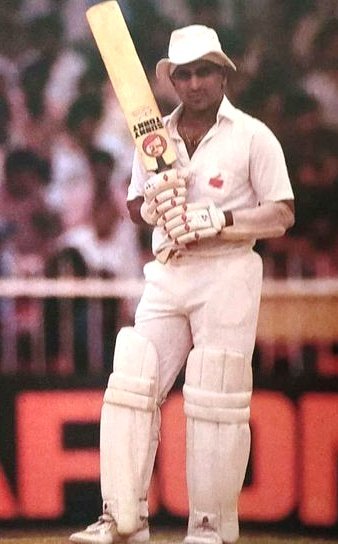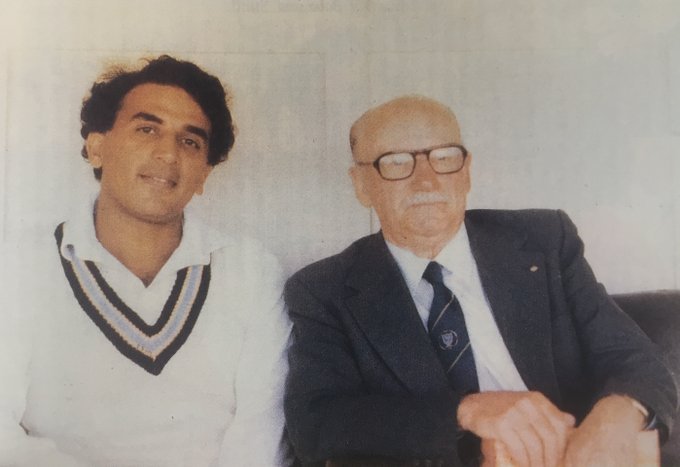As we left the ground at Kanpur, the crowds lined up on either side of the roads and began making a vigorous cutting motion with their right index fingers across the bridges of their noses. We had just lost the first Test of the series in three and a half days, and it was the crowds’ way of letting us know that the Prudential Cup Champions had let them down. We have seldom done well in the first test of any series against a team that has a good speed attack, so the loss at Kanpur was no big surprise.

After fielding for the better part of two days, we were left with the last awkward hour before the day’s play ended. The West Indies bowlers knew that they had to bow! Only a few overs, and so they went flat out on a flat pitch. When the bowlers, especially quick bowlers, know that they may have to bowl through a day, they prepare themselves accordingly.
In this case, they were aware that they would have to bowl! a maximum of 14 overs or so and then rest for the night and come again fresher the next morning with the ball also likely to be still new and hard, and thus they really charged in and made shambles of our batting and dented our morale enough for them to repeat the performance and the second innings.
With only two days separating the first two tests, an urgent rethink was required by the team, and the individuals conceded that nobody likes to lose and nobody likes to fail, though in a sport that is bound to happen more often than not.
I had decided after the Prudential Cup to go out and enjoy batting, but for far too long I have let the responsibility and pressures of being an opening bat curb my enjoyment of batting. Even against Pakistan in the series preceding, I had begun attacking and then went into a shell again, from which it was difficult to recapture the earlier attacking rhythm. This West Indies attack defense is going to be no good. How long is one going to keep the ball down? There is one that is not going to rap your knuckles but is a couple of inches higher on the back of the palm, and then it’s goodbye. At least it would be better to get out and play an attacking shot.
So when the morning of the first day of the Delhi Test dawned, I was calm and decided. In Kanpur on the first day, I had a heavy heart, but here in Delhi, there was almost a light heading feeling. I had seldom woken up on the first morning feeling so good. The previous night, we had gone to bed rather late. My wife’s friend, through her college years, had come down from Dehra Dun.
They had not seen each other for almost nine years, so catching up with gossip was naturally long. Her sisters and brother all joined in at various times in the evening, and through the partly open door of the room, I could see the hotel security staff walking up and down the corridor, rather worried at the laughter and noise emanating from our room.
Before they left, Bijoya, suddenly realizing that it was late, was apologetic but at the same time insisted that the next day was going to be her first day at a cricket game. I better not disappoint her. At least she didn’t say those words, which I had begun to dread: “We want the 29th century.”. These well-meaning words were beginning to sound a little jarring to the ears as almost everybody I met, whether it was at a party, a function, in a taxi, a train, or a plane, asked the question When?”.
Let it not be misunderstood that I did not appreciate the concern and good sentiments behind these words. I knew full well that there were prayers offered at various temples all over the country for my scoring the century. I also know that when I did achieve it, there must have been thousands who were happier than me. Like when Prakash Padukone won the All-England Badminton Championship, I was walking around feeling ten feet tall, which is almost twice my height.
Bijoya shouldn’t have worried about the late hour because late nights have never bothered me. All my three double centuries have come the day after a night where I had hardly slept. In fact, I can confess now that on my first tour to the West Indies, I seldom returned to the room early. So much so that when Vish was asked by a common friend, “How was Sunil as a room partner?” He retorted, “Wt room-partner?” Needless to say, they are not recommended to young, up-and-coming cricketers.

When Kapil Dev returned to the dressing room with a big grin, signifying he had won the toss from Clive for the first time in Tests, I felt the familiar tightness in my stomach. Then Dilip Sardesai informed us that we had to go down to be introduced to the president, and that suddenly eased everything. We went down and stood, waiting to be introduced. However, the president was just a little late, and I ran back to the dressing room to clean up without being introduced to him.
The first ball of the match was a good-length delivery that was kept low and just made contact with the bottom of the bat. I was off the mark in the same area. The rest of the inning was a blur in my mind. I remember, though, feeling a little odd at not receiving applause for 50 runs. I don’t look at the scoreboard when I bat, nor do I know what time it is.
Probably my 50 was achieved with a boundary, so the applause must have mingled with the applause for the shot, and so it didn’t register. And thus I was taken completely by surprise when Dilip Vengsarkar stopped and shook my hand, saying, “Bloody Hell! It’s your twenty-ninth.”. I knew I had hit a few boundaries, but I never knew it was that close. In a way, it is a vantage point not to look at because there are no nervous nineties.
In centers like Bombay, one knows anyway because the crowd starts slow hand-clapping when one is within a shot of the mark or the transistor radios are loud enough to carry the voice of the commentators to the center. Here in Delhi, the security was so strict that transistors were not allowed into the ground, and the Delhi crowd did not slow hand-clap to make me aware I was close to the ton.
Clive Lloyd was there to grip my hand in that big palm of his, as were Viv Richards and Jeff Dujon. I had suddenly become numb with the realization that I had drawn level with Sir Don Bradman statistically. I played thereafter in a daze, and it was no great surprise when my off-stump was knocked back by Larry Gomes of all people. I had played that ball as if in a trance.
When I got back to the dressing room, the guys came around with congratulations, but the best comment was from Sandip Patil. He said, “Well done! Now you have to play them in four more tests.”. That’s meaning not the innings but the fast bowlers. Trust Sandy to come out with a crack like that.

Delhi has a big dressing room for the home team but has poor toilet facilities, so a shower was out of the question. Luckily, there was water in the taps in the basins. Obviously, the department concerned had been given their quota of tickets. Awash, therefore, was all I could have before going out to meet the press, who were keen to hear my comments. Even in a moment like this, I had to get the permission of the manager to speak to the media.
The ban on writing about the Indian players has done so well for the West Indian players, who are now reportedly quoting and getting twice as much as what the Indian players were being given. Good luck to them! So only one team’s viewpoint is known to the followers. In cricket, as in any sport, views are bound to differ, and especially in cricket, there is seldom any unanimity of opinions. It would have been better if one or two of the Indian players were also allowed to write so that the reader would get a balanced view of both teams.
Anyway, among the mediamen present and asking questions, one could see the sparkle in their eyes. In spite of misunderstandings in recent years, I could see that they were happy for me, and I appreciated that. Only one pressman looked as if he had swallowed the bee. It has been a regular, nasty, ill-formed, prejudiced, and ignorant attempt to get me out of Indian cricket. He didn’t ask a single question.
In any case, you have to know something about the game to ask questions. After their questions were answered, I had to go to the TV commentators’ box for their interview, and I watched Dilip complete his century from there. I was happy for him. He had been off the Indian side, and now he had come back and shown that he could get runs. His confidence at the wicket had boosted mine, and I saw that there were no breakthroughs for the West Indies. It was a well-deserved century.
We returned to the hotel amid crowds that were much more pleasant than in Kanpur. In the lobby of the Hyatt Regency, the directors of the hotel, the lobby manager, and the other staff were waiting with soft drinks and two cakes, one for me and one for Dilip, which we cut and ate and distributed to the rest of the team.
The cables had started arriving, and the phone had gone crazy. The B.B.C. was quickly on bail and did a live telephonic interview (I hope the board doesn’t mind), and there were visitors streaming into the room. It was then that I wished I had a suite because then we could have looked after the well-wishers better.
Dinner for the night was with a very dear friend, Peter Hassan, who was leaving for London early in the morning, and so it was our only chance of seeing him and his family on this visit to Delhi. Peter has little idea about cricket, and this is refreshing because I don’t have to talk cricket with him. So much is his ignorance about the game that he asked me the classic question, “Does Bradman have a chance of going ahead of you?” I had to explain to him that Sir Don Bradman retired from Test cricket even before I was born, and there was no chance of Sir Don Bradman going ahead of me.
After dinner at his place and wishing him and his lovely wife Doreen an enjoyable journey, we went to a disco at the Taj Hotel. Sandip was already there, and we sat with him till late. When we returned to the hotel, the first editions of the papers must have been rolling out of the presses. My feet were tired, not from batting but from dancing. It was all good fun, a moment to cherish, a moment of happiness for me, my family, relatives, and all the well-wishers, but all through it, I kept on thinking that the distance between Kanpur and Delhi is really not as much as the distance between the edge and the middle of the bat.
